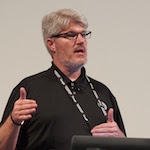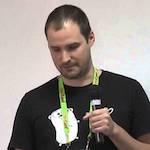GopherCon Russia 2018: Conference Program Ready

Hello!
We continue to talk about GopherCon Russia , which will be held March 17 in Moscow. In the last post, we walked through the first half of the program, and now it is completely ready. For example, Go Time podcast leader Brian Ketelsen and Microsoft technical evangelist Ashley McNamara will come and speak at the conference.
')
Recall that there will be two parallel streams of reports from 10.00 to 19.00, a fiery afterparty in the bar from 19.00 and against the stop, steep activities from our partners. By the way, on March 16 there will also be a couple of chamber events about Go, details coming soon. We are waiting for the conference 400 participants (200 of them have already registered), join us !
If you really, really love Go, you can not read further, but register on the site immediately. Ticket price - 7000 rubles.
So, who and what else will tell:
 Brian Ketelsen , organizer of GopherCon in the States, leading Go Time podcast, Dev Advocate at Microsoft and an open-source enthusiast.
Brian Ketelsen , organizer of GopherCon in the States, leading Go Time podcast, Dev Advocate at Microsoft and an open-source enthusiast.GOPATH and compiler references.
The "go" command line tools provide a convenient way to maintain the compiler and linker. But they don't show it in town. In this case, you can compile your code.
 Ashley McNamara , Microsoft technical evangelist, mentor at WeWork, General Assembly, AngelHack and CapitalFactory, organizer of Redis Austin, Big Data Analytics Club and Austin All Girl Hack Night. And Ashley draws beautiful gofers!
Ashley McNamara , Microsoft technical evangelist, mentor at WeWork, General Assembly, AngelHack and CapitalFactory, organizer of Redis Austin, Big Data Analytics Club and Austin All Girl Hack Night. And Ashley draws beautiful gofers!Go best practices.
 Dmitry Vyukov , Google. The creator of the race detector and execution tracer in Go, the author of many improvements to the runtime language. I put my hand to the support of parallelism and multi-core: parallel garbage collection, gorutin scheduler, channels, synchronization primitives, etc.
Dmitry Vyukov , Google. The creator of the race detector and execution tracer in Go, the author of many improvements to the runtime language. I put my hand to the support of parallelism and multi-core: parallel garbage collection, gorutin scheduler, channels, synchronization primitives, etc.Fuzzing: new unit testing.
Fuzzing is testing programs with incorrect, unexpected or random input data. In the report I will talk about the types of fuzzers, how they work and about the existing implementation for Go - go-fuzz. We will write and run a real fuzzer. Find errors in the standard library in a couple of minutes. I will also talk about how fuzzers can guess the correct CRC checksum in the input data, help with regression testing, find logical errors in the code, and how we use fuzzing in Google.
 Brad Fitzpatrick , Google. Go team member, author of many standard library network packages. Previous creations: LiveJournal, OpenID, memcached.
Brad Fitzpatrick , Google. Go team member, author of many standard library network packages. Previous creations: LiveJournal, OpenID, memcached.Go: looking back and looking forward.
 Vadim Markovtsev , source {d}: Google Developer Expert on machine learning, an implacable user of Open Source. Former system programmer, today pretends that he knows deep learning and evangelizes ML on the source code. Suffers from a lack of generics in Go.
Vadim Markovtsev , source {d}: Google Developer Expert on machine learning, an implacable user of Open Source. Former system programmer, today pretends that he knows deep learning and evangelizes ML on the source code. Suffers from a lack of generics in Go.How to measure the mood of the code in the Git repository.
Take the Sentiment Neuron - a model for determining the tonality of the text and Tensorflow to Go. We take out comments from the source with Babelfish and run the repository through Hercules. As a result, with several lines we build a graph of how the developmental tone has changed over time.
 Elena Grahovac , is working on the RTB-system at DCMN and is co-host of the GolangShow podcast. He likes to solve problems of automation of various processes and, of course, uses Go for this.
Elena Grahovac , is working on the RTB-system at DCMN and is co-host of the GolangShow podcast. He likes to solve problems of automation of various processes and, of course, uses Go for this.We automate the construction of a map of services.
If your project consists of various services, repositories, and message brokers, you may have thought about building a map of the interaction of all these resources. There are many problems with a manual map: it is constantly becoming outdated, it does not provide the necessary level of detail, links to documentation and other useful materials.
Let's talk about how you can automate the preparation of such a map and write a tool to build it in real time.
 Andrei Drozdov , six years in IT, has developed a pilot version of sharding for Tarantool 1.6, by tarantool-debugger. Now working in the Avito search team.
Andrei Drozdov , six years in IT, has developed a pilot version of sharding for Tarantool 1.6, by tarantool-debugger. Now working in the Avito search team.Build a search ecosystem on Go.
In my report, I will talk about the search engines device based on live examples, what has already been done in the Go community on this topic, compare the performance of the “self-made” search engine on Go and the solutions on the riot framework. In addition, I’ll tell you how to build a search infrastructure in the company and quickly launch new search algorithms.
 Oleg Shevelev , ivi.ru. He has been writing Golang for more than three years, during which time he has been doing a seamless migration of Redis-clusters, microservices in k8s, various parsers, open-source.
Oleg Shevelev , ivi.ru. He has been writing Golang for more than three years, during which time he has been doing a seamless migration of Redis-clusters, microservices in k8s, various parsers, open-source.Gometalinter is our everything.
We learn to test the code without writing tests (and with them too), we make our linters and know more about the code than before.
 Vitaly Levchenko , timlid in megafon.tv, writes on Go with the release. He was engaged in the development of high-loaded dating and advertising. Organized Go-mitapy in St. Petersburg.
Vitaly Levchenko , timlid in megafon.tv, writes on Go with the release. He was engaged in the development of high-loaded dating and advertising. Organized Go-mitapy in St. Petersburg.You are writing tests wrong.
It happens that you wrote the code, drove the unit tests, and then check the result with your hands in different cases? Are there often bugs, regressions in your application that do not catch unit tests? Do you have a feeling that your tests work poorly? Or on the contrary, are you spending too much time on tests? Many learned to write tests on a whim, wrote on the residual principle. This created the picture that we see around us. I will tell you what problems can be with your tests, how to do them well, and how to learn how to do it systematically. On go.
 Konstantin Cherkasov , commands the search team in Lazada (Alibaba Group) and still has not lost his mind. In the world of Go since 2012.
Konstantin Cherkasov , commands the search team in Lazada (Alibaba Group) and still has not lost his mind. In the world of Go since 2012.OpenTracing is not only for distributed tracing.
Distributed Tracing greatly simplifies the operation of large systems with multiple microservices. However, this does not mean that tracing is useless for simple services and monolithic applications.
The report will discuss OpenTracing, as a unified approach to backend service instrumentation, which is applicable not only in large systems.
Behind the scenes, there was only one speaker with the letter E, but we still keep the intrigue :)
* This joke will be understood by those who discuss the conference on slack.golang-ru.com , channel #gophercon.
Come! The ticket now costs 7,000 rubles, but from March 1, the price will rise again, do not delay.
All the details and registration on the site . And you can follow the announcements in the telegram channel or twitter .
Many thanks to the partner companies that make the conference possible!
The general partner is Gett .
Gold Partners - IToolLabs and Avito .
Silver Partners - JetBrains and Neuron.Digital .
See you on March 17 in Moscow!
Source: https://habr.com/ru/post/348466/
All Articles